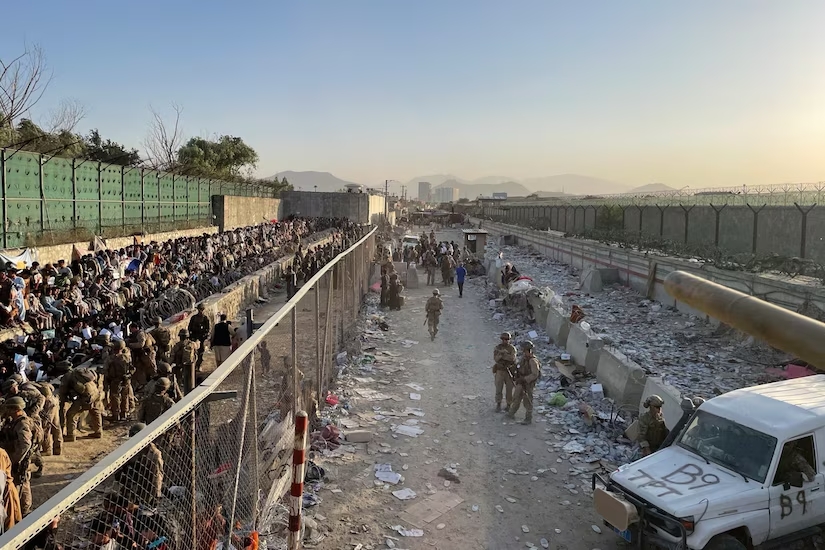Three years have passed since the catastrophic suicide bombing at Abbey Gate in Afghanistan, yet the US remains locked in an unyielding chase for the ISIS-K network behind the act.
The explosion occurred on August 26, 2021, marking a grim conclusion to America’s longest war. The attack claimed the lives of 13 US service members and about 170 Afghans who were frantically seeking American help to flee the Taliban’s relentless push toward Kabul.
Despite significant efforts to dismantle the ISIS-K network, Pentagon officials confirm that the group remains active, though it is now considerably weakened.
Christopher Maier, the Pentagon’s Assistant Secretary for Special Operations and Low-Intensity Conflict, described the ISIS-K network as “pretty degraded” but not fully eradicated.
In a recent discussion with reporters, Maier explained that “a lot of allied and partner disruptions” have substantially impaired the group’s ability to execute large-scale attacks.
“We have made significant dents in this network that conducted the Abbey Gate attack,” he affirmed, underscoring ongoing efforts to address the threat.
US President Joe Biden, addressing the nation immediately after the attack, pledged retribution against those responsible. His statement, “We will not forgive, we will not forget, we will hunt you down and make you pay,” has guided US counterterrorism efforts since.
Maier reiterated that the US is actively working to fulfill this promise, with significant progress in disrupting the ISIS-K infrastructure that facilitated the Abbey Gate bombing. Maier also addressed the complexity of the ISIS-K network behind the Abbey Gate attack, noting that it involved multiple individuals leveraging the group’s infrastructure.
Since the attack, US and allied forces have achieved notable successes in disrupting related networks. Maier highlighted the role of Central Asian countries in this effort, although he did not specify which nations had contributed to thwarting recent plots.
The attack cast a long shadow over the US withdrawal from Afghanistan, which was marked by a chaotic and tumultuous exit amid the Taliban’s rapid resurgence.
The operation, which successfully evacuated approximately 124,000 Afghans, has faced intense scrutiny. Critics have described the withdrawal as poorly managed, with the Abbey Gate attack serving as a central point of this criticism.

Deadly 2021 Bombing At Kabul Airport
In the final days before the devastating explosion at Kabul airport, a sea of Afghans amassed outside the perimeter, urgently trying to escape the city.
After the Taliban seized control of Kabul on August 15, 2021—a return to a brutal regime that the US and its allies had spent nearly two decades trying to dismantle—the sense of desperation outside the airport was evident and overwhelming by August 26.
With the US military nearing its withdrawal deadline, the threat from ISIS-K loomed larger. The US Embassy in Kabul had issued stern warnings urging people to avoid the airport unless they had direct invitations from American officials.
Despite these advisories, the crowds continued to grow. On August 26, 2021, a horrific explosion shattered the crowd outside Kabul airport, killing more than 180 people, including 13 US service members.
The Afghan branch of the Islamic State, known as ISIS-K, claimed responsibility for the bombing, marking it as the deadliest single attack on US forces in Afghanistan in over ten years.

In the aftermath, there were reports of gunfire, either directed at them or others. However, the Pentagon has consistently asserted that all injuries and deaths resulted from the explosion and the shrapnel it produced.
While there was some gunfire from American and British forces, the Pentagon described this as minimal—three brief instances: 25 to 30 warning shots from British troops and two bursts of gunfire from US troops targeting suspected militants, with no injuries reported from these actions.
The issues related to the gunfire and conflicting testimonies, including statements from a former service member injured in the blast who alleged that the military never interviewed him about the incident, fueled considerable criticism of the US government. This service member also contended that the bombing might have been preventable.
The controversy surrounding the attack led to a supplemental review by the US Central Command in September 2023, prompted by severe criticism and emotional accounts from survivors shared on social media and in Congressional hearings.
This review, completed on April 15, 2024, confirmed that a single ISIS-K bomber was responsible for the attack. The review found no new information that significantly altered the conclusions of the November 2021 investigation and did not recommend any changes.
It also did not address the numerous reports from Afghan survivors about substantial gunfire following the explosion. The review reaffirmed that the bombing could not have been prevented, maintaining the conclusions of the original investigation.
- Contact the author at ashishmichel(at)gmail.com
- Follow EurAsian Times on Google News




